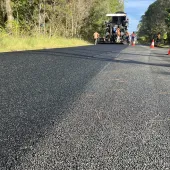Shell Bitumen Innovations, Developments and Opportunities

First published in the July 2016 issue of Quarry Management as A Look into the Future
Shell Bitumen highlight their emphasis on innovation and look at recent developments and future opportunities
By Professor John Read, general manager technology, Shell Bitumen
As a global business Shell place great emphasis on innovation. Apart from the company’s business divisions for oil and gas exploration and extraction (Upstream), processing and marketing of oil products (Downstream) and the integrated gas trade (Integrated Gas), Shell have a separate division – Projects and Technologies – where all research and development works are concentrated.
More than 10,000 of Shell’s 90,000-plus employees work in the Projects and Technologies division. The research locations are spread out all over the world and focus on different issues.
In Europe, the company’s Hamburg laboratory is the centre of expertise in worldwide fuel and lubricant research. Here, scientists work on how to make conventional fuels, such as petrol and diesel, even more efficient. Their focus also lies on advancing the development of alternative energies for road, maritime and air traffic. Hamburg is also where the fuel for Ferrari in Formula 1 is produced and filled into containers for transport to racing events.
However, the centre of Shell’s bitumen research and development is located in Bangalore, India. The facility here is closely networked with technology centres in Houston, Bangkok, Shanghai and Beijing, and the European Solution Centre in Strasbourg. This laboratory provides the impetus for the Shell Bitumen trade worldwide. The company currently sells around 12,000 tonnes of bitumen daily to 1,600 clients in 28 countries – enough to surface 450km of roads each day or 1km every four minutes.
Thanks to this international, leading-edge research, Shell Bitumen can offer solutions to improve the quality of road infrastructure, such as addressing deformation, resistance, noise reduction, safety and economic efficiency.
Among these solutions are high-performance products such as Shell Cariphalte, a polymer-modified binder with very high resistance to deformation and excellent low-temperature flexibility, and which is, therefore, well suited to extreme conditions as well as making sound economic sense on a whole-life cost basis.
Shell Cariphalte is not only used on the busiest roads in Europe, but also on more unusual traffic areas. For example, it has been used to pave the taxiing, take-off and landing runways of some of the biggest international airports in the world, including Heathrow and Gatwick airports in London, Frankfurt, Hong Kong and Dubai. Shell Cariphalte is also used in many Formula 1 racetracks, such as those in Singapore, Malaysia and Hockenheim, and the Ferrari test track in Fiorano, Italy.
For many years Shell Bitumen have also focused their efforts on asphalt recycling. Shell Cariphalte RC is the company’s innovative, cost-effective solution that helps conserve natural resources and reduce total asset cost. Launched more than 16 years ago, it is a polymer-modified bitumen designed for high-performance road applications in combination with reclaimed asphalt pavement (RAP) in base, upper and high-quality layers.
Another example of the company’s innovation is Shell Bitufresh. This is an additive which reduces bitumen odour, and can, therefore, significantly improve the work environment during asphalting works. In recognition of the company’s innovative approach, Shell received the International Road Federation’s Global Road Achievement Award for Research last summer for Bitufresh, and in June 2016 the product was launched in France. Currently, Shell Bitumen have 49 active patent series reflecting their focus on research and development over the last 96 years.
Looking to the future, there are many more opportunities to innovate. Shell Bitumen have developed synthetic bitumen emulsions that reduce nitrous oxides in the air by converting them into harmless nitrates that wash away from the road surface. The company has also created a phosphorescent binder that absorbs light during the day and then emits it at night to reduce the need for ambient street lighting. Moreover, Shell Bitumen have developed conductive asphalt that absorbs heat, which is then converted into electricity to feed the grid, and active asphalt that attracts PM10 particulates from the air to the road surface.
These innovations demonstrate that it is possible for roads to contribute to sustainable development and to do more than just carry people and goods from A to B. However, route to market remains an issue for products such as these that cross more than one Government department, and work will need to be done for these types of products to become effective contributors to society.
Offering innovative products is only one key aspect to success; the other is a robust supply and distribution network.
Due to numerous refinery shutdowns and configuration changes, bitumen supply on the European continent has changed fundamentally in recent years. Shell set the right course in good time, and through long-term strategic investments, production at the refineries in Godorf, near Cologne, and in Pernis, near Rotterdam, was significantly increased. Furthermore, expansion and improved flexibility of transport routes, to include ship and tank wagons, as well as combined transports, has helped to optimize and increase the supply chain coverage from the refinery, via depots, to the customer.
Finally, a constant market challenge is the continuing price volatility, which makes it difficult for asphalt manufacturers to safely calculate the cost of long-term road construction projects or those that are still far off in the future. Shell have responded to this with innovative risk-management concepts, and offer customers price certainty, price flexibility as well as volume and purchase flexibility.
About the author: Professor John Read has worked in the bitumen and sulphur industry for nearly 30 years, from bitumen analytics to asphalt supply in a range of roles at Shell. He recently finished two terms as the vice-president of Eurobitume and as Shell’s primary director of the Asphalt Institute in the US.
• Subscribe to Quarry Management, the monthly journal for the mineral products industry, to read articles before they appear on Agg-Net.com








